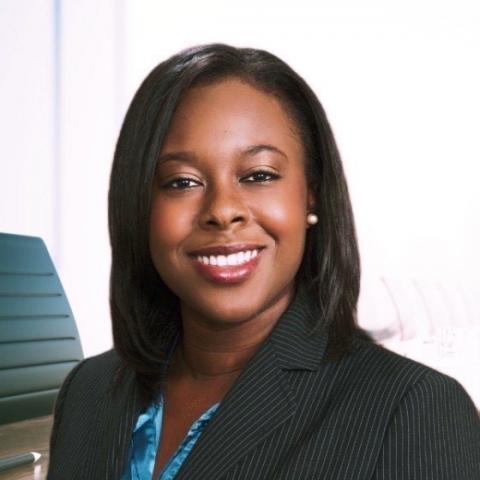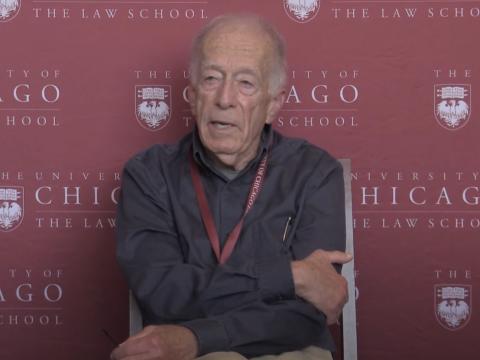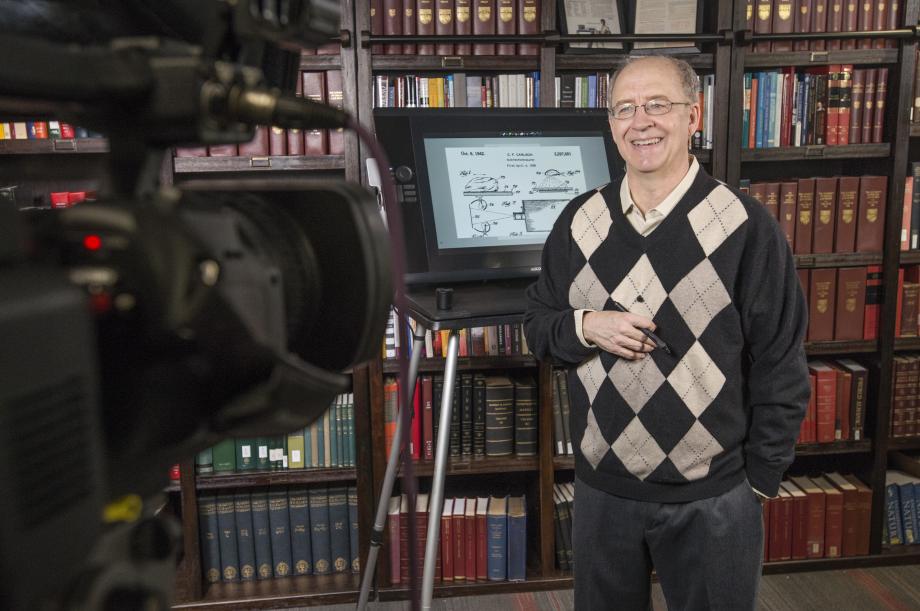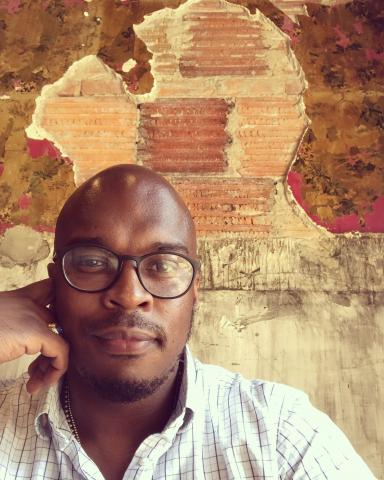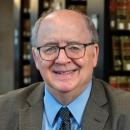Enriching the Exchange
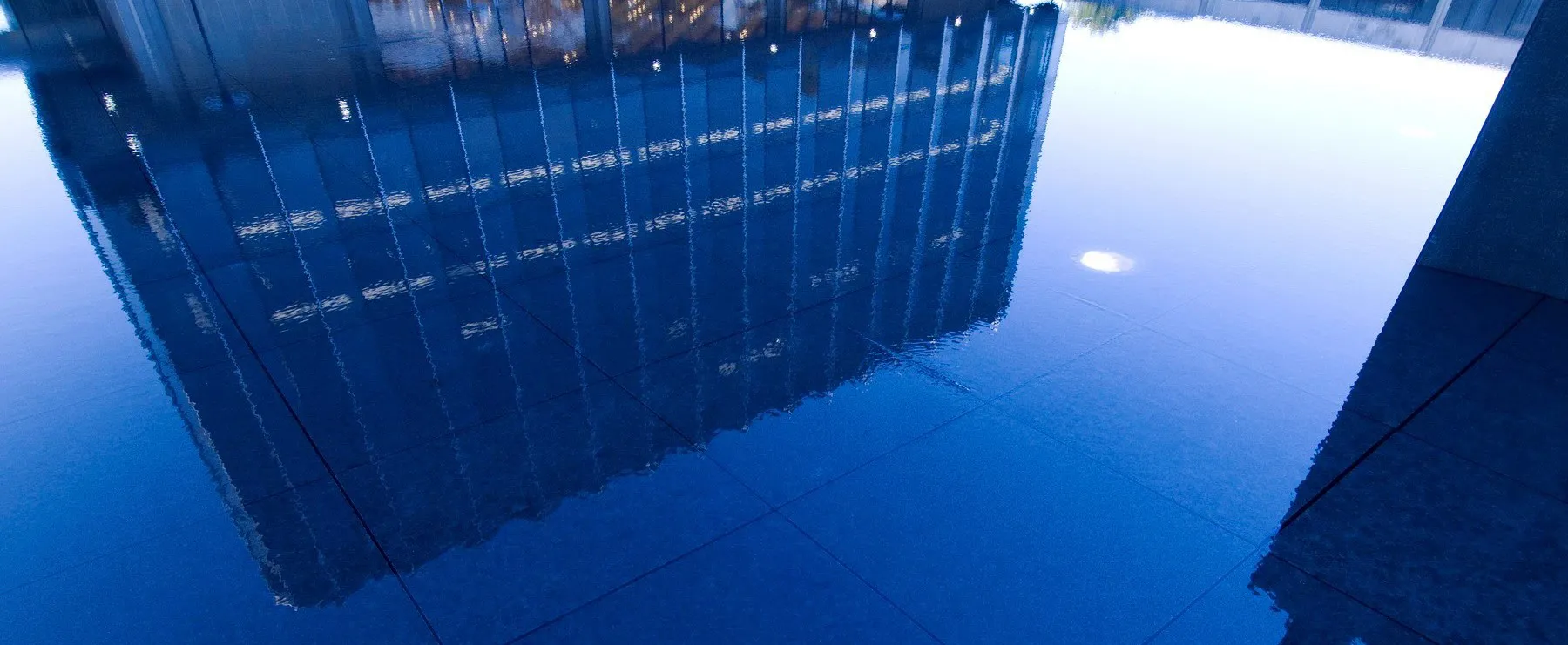
It was a summer evening and Professor Randal C. Picker, ’85, was presiding over an expansive 95-minute Zoom debate about antitrust policy, the fourth session in a six-week seminar held exclusively for Law School alumni.
Thunderstorms were brewing in Hyde Park as he guided nearly two dozen participants in a conversation that zipped from predatory pricing to whether Facebook had become—or was even capable of becoming—a speech-dampening monopoly. But onscreen, the sun was visible behind a couple of participants, and their Zoom boxes formed a collage marked not only by their varied locales, which stretched from East Coast to West Coast, but by the range in experience and expertise informing their exchange. Assembled alumni included antitrust lawyers at the beginnings of their careers, several with many years of experience in the field, and some whose careers rarely touched the topic. There was an Israeli attorney who earned his LLM this year, a telecommunications company lobbyist, and the host of a political interview show. Some participants were former students of Picker’s. One was Picker’s former Law School classmate. Another graduated from the Law School in 1955, four years before Picker’s birth.
“I don't know that we've ever had this kind of across-graduation-year substantive interaction with our alums,” Picker said of the seminar, which used as its central text the 2021 book Antitrust: Taking on Monopoly Power from the Gilded Age to the Digital Age by Picker’s Law School classmate, Senator Amy Klobuchar, ’85. “It was really pretty amazing.”
The series represented a new category of educational outreach: this wasn’t like a law school course, filled with students who are new to legal thinking, and it wasn’t like a one-time Faculty Masterclass at Reunion. It didn’t even feel like the Massive Open Online Course (MOOC) that Picker taught in 2015; that had drawn tens of thousands of viewers from around the world but lacked real-time debate. Instead, the summer alumni seminar was a cerebral romp untethered by geography, legal practice area, or age—and made possible, in part, by the webcams and Zoom accounts that became so ubiquitous during the pandemic.
“Before this, I hadn't ever had an opportunity to be in class with such a wide variety of people in various industries, who are in different stages of their careers, and who have varying levels of expertise on the subject,” said Karice Rhule, ’16, a New Jersey-based attorney who works in-house at Johnson & Johnson. “I don’t think this combination could have easily been replicated elsewhere. What Randy did is rare.”
When someone mentioned recent litigation involving the social media site Parler, one of the participants shared insights based on his firm’s involvement in the case. When the Federal Communication Commission’s now-defunct Fairness Doctrine came up, a retired appellate lawyer who had litigated Fairness Doctrine cases in the late 1960s spoke up.
These contributions added a richness to the discussion, participants said—a way of connecting their debates to the real world, not just now, but over time. The group’s political diversity, and their differing takes on Klobuchar’s ideas, often led to robust exchange. And the Law School’s historic eminence in antitrust scholarship factored in, too, with participants exploring not only the history of antitrust policy in the US but the history of antitrust teaching at the Law School.
“You would get, ‘When I was here [Professor] Aaron Director did this,’ or ‘When I was here, [Professor] Bill Landes or [Professor] Andy Rosenfield did that,’ “ said Richard Leverett, ’10, AT&T’s director of external affairs for northern Indiana. “We [talked about] who taught what when—there was sometimes a 20-year gap between participants who’d had the same professor—and we’d hear what they learned from that professor and what their perspective was. It enriched the experienced overall.”
Robert Lichtman, ’55, for instance, had taken the Antitrust class co-taught by legendary professors Edward Levi and Aaron Director—a course often celebrated as one of the greatest Law School classes of all time. Levi and Director, both well respected, often disagreed; it was a central feature of their collaboration.
“Levi was a very forceful figure … and Director was straight Chicago School of Economics,” Lichtman recalled one day several weeks after the seminar had concluded. “I remember … reading cases about practices like resale price fixing and tying arrangements, which Director said wouldn't happen because companies wouldn't maximize profits if they engaged in those practices. But we were reading these cases [in which this did] happen, and Levi was kind of sharp with Director. Director retreated to the back row of the classroom, I think to avoid Levi’s criticism.”
Lichtman, a retired lawyer and the author of three books, chuckled as he remembered the dynamic between the two scholars.
“It was an excellent course,” he added. And one he hadn’t taken until his 3L year. During Lichtman’s 2L year, Levi hadn’t been teaching and Director was instead joined by “some downtown antitrust lawyer in his 30s.”
“I’m sure he was a very good antitrust lawyer, but I wanted Levi,” Lichtman said. “That antitrust lawyer, by the way, was [future US Supreme Court Justice] John Paul Stevens.”
“We were seeing that connectedness and those intellectual bonds stretching across the Law School over an extended period of time.”
Randal C. PickerJames Parker Hall Distinguished Service Professor of Law
There aren’t many opportunities for that sort of intergenerational story sharing among unrelated alumni, said Picker, the James Parker Hall Distinguished Service Professor of Law, who made it a point to ask Lichtman about the Levi-Director class at one point during the seminar.
“We had people in the room who had touched that history at different times,” he said. It enabled them all, he added, to briefly touch that history, too. “We were seeing that connectedness and those intellectual bonds stretching across the Law School over an extended period of time.”
Another Mode of Teaching
Unexpected connections and opportunities to engage with people of varied perspectives and experience are important avenues of learning, and Picker had been eager to see how that would play out over the course of the seminar.
The Law School’s Office of External Affairs developed and ran the seminar as an opportunity for alumni to engage academically with a member of the faculty. Picker shared that mission and was drawn by the chance to further explore how digital platforms allow institutions to widen the boundaries of academic discussion. He has long nurtured a fascination with pedagogy: How do we learn and process ideas? How can digital platforms be used not just as substitutes but as valuable avenues for substantive exchange? What techniques allow a professor to go from imparting information to expanding the mind—and how might that shift with audience and medium?
In the classroom, Picker moves and engages; he sets aside time for students to “talk to their neighbors” to develop, test, and expand ideas, and to help information find a more permanent home in the brain. When he taught his MOOC, he devoted time to thinking about what would translate via video: he considered movement, props, lighting, and even his hand gestures. He and his team discussed ideal segment length and whether to release the series episode by episode or all at once. (They chose the latter, and some fans binged the MOOC in a matter of days).
The MOOC, filmed in a studio on campus in the spring of 2015 and released that summer, was satisfying in its reach but felt like a one-way street. It turned out to be fairly distinct from the experience Picker would have five years later when he and his colleagues suddenly found themselves teaching Law School classes via Zoom. Engagement was not only a possibility but a necessity as classes made the sudden pivot to remote format in the spring of 2020, and Picker immediately began thinking about how to create an effective virtual classroom.
He used breakout rooms as a proxy for his live “talk to your neighbor” segments and experimented with new ways of keeping the conversation flowing online. As Zoom technology evolved, he thought about how to arrange participant windows on his screen and whether he should spotlight key speakers.
The antitrust seminar was a chance for Picker to iterate on these previous experiences, blending the interactive nature of the classroom with the geographic breadth of a MOOC or a webinar.
Webinars, in particular, had underscored for him the value of dialogue. The MOOC, at least, was meant to be filmed in advance. But a webinar has a real-time, but generally passive, audience. Early in the pandemic, Picker had participated in a Brazilian conference, reaching 1,500 people whose faces he couldn’t see as he spoke. “It was a good talk, but it was soul sucking,” he said. “I couldn't see anybody—it was like one of these Twilight Zone episodes when the last person on the planet is just standing there.”
He knew this summer alumni seminar needed to include human connection, so he structured the entire series with engagement in mind. During each of the six sessions, eight of the participants were required to write a 500-word blog post based on the roughly 60 pages Picker had assigned that week. That meant each participant was “on call” during two sessions, serving as a leader in the discussion.
The sessions ran a full 90 minutes, not including a five-minute break in the middle, with Picker acting as maestro throughout. He guided the discussions, always keeping an eye on the “raise hand” icons and regularly rattling off the names of those who would speak next. Occasionally, a few participants would stick around at the end of the Zoom to continue the conversation—“an after-party of sorts,” Picker said.
Common Ground
As it turned out, the group’s major commonality—a University of Chicago Law School education—was as valuable as their differences. The discussions, some participants said, were like returning to Hyde Park; it was a luxury to convene for the sole purpose of unpacking ideas, UChicago-style.
In the professional world, “you don't necessarily get the same intellectual stimulation or have the same deep conversations you get from hanging around with folks at U of C,” Leverett said. “I think the class did that a lot, and it allowed us to take a deeper dive in a way that I think that sometimes only we can.”
Rhule enrolled for that reason, too; exploring the nuances of antitrust policy with fellow alums sounded invigorating and fun. Besides, she’d already missed one opportunity to study the topic with Picker, and she didn’t want to bypass another.
When she was a third-year student, Rhule signed up for Picker’s Antitrust class and, although she loved the first session, she ultimately decided to take a mergers-and-acquisitions seminar thinking that it would more closely align with her future work.
“Famous last words,” she said, laughing. Not long out of law school, as a law firm associate, she was assigned to do antitrust work related to the AT&T/Time Warner merger and ultimately became a member of the firm’s trial team, representing Time Warner in the US Department of Justice’s lawsuit to block the merger on antitrust grounds. She found her time on the antitrust team intellectually captivating, and although antitrust isn’t a daily part of her current work, she still loves thinking and talking about these issues, particularly with people outside her typical professional sphere.
“I’ve seen antitrust law through a corporate lens, and I normally talk about antitrust with other corporate lawyers, and so for me one of my favorite aspects [of the seminar] was hearing from people who view it through a scholarly lens,” Rhule said. “There was one participant [who teaches at a law school] and it was nice to hear her perspective. We had someone else who works in government, and he sees it through that lens. There were people who, because of their experience, were able to correct misconceptions that I admittedly had. It's not very often that we get to step out of our own little bubble like that. It definitely gave me more depth and breadth of thinking on the subject.”
For Picker, who has studied and taught antitrust law for years, the opportunity to explore the topic with alumni provided a satisfaction that complemented his experiences teaching students.
“When you’re a student, you don’t know as much—that’s just the stage of life you’re at,” Picker said. “But [in the alumni seminar], these were people who knew things, who have these different experiences and could draw on those experiences. That’s a different room atmosphere. Instead of ‘This is how I imagine it might be,’ we had people who said, ‘Well, I’ve done this, and this is how it actually is.’”
In the end, this is what made the seminar a success, Picker and others said: it was the people in the room.
“We had this group of people who wanted to seriously engage, who had this common background as University of Chicago Law School graduates, and who had very different life experiences, and we brought them all together to have these targeted conversations about a topic that I care a lot about—and that obviously many of them care about, too,” Picker said. “I have not had that kind of situation in my career before. It was a really special treat.”
